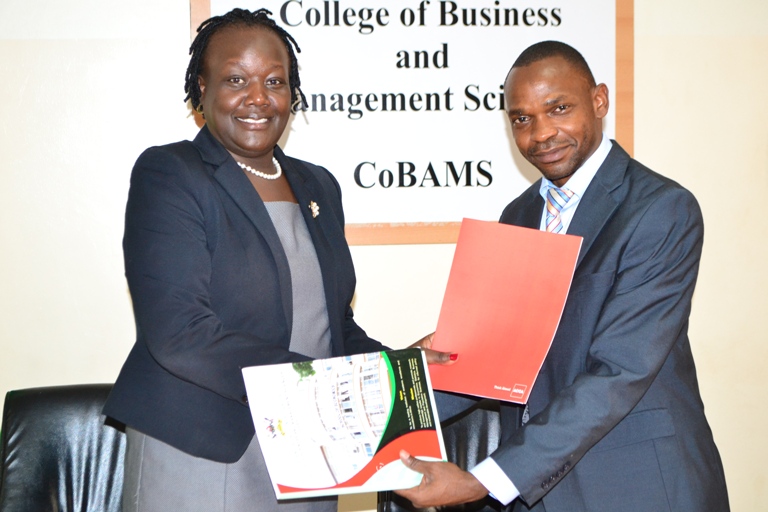On Monday 29th February 2016, Makerere University together with the Association of Chartered Certified Accountants (ACCA) Uganda signed an auxiliary Memorandum of Understanding to provide professional courses and standards to Makerere University students studying Bachelor of Commerce at a subsidized fee.
The auxiliary Memorandum of Understanding (MoU) will equally support the students to enhance their professional development and careers in accounting, business and finance.
In October 2014, ACCA Uganda and Makerere University developed a collaborative relationship when both institutions signed a Memorandum of Understanding to promote sustainable development of the Accountancy profession in Uganda. The parties equally agreed to share best practices in accounting, business and finance required by global standards.
According to the Dean School of Business-Makerere University College of Business and Management Sciences (CoBAMS) Dr. Umar Kakumba, the auxiliary Memorandum of Understanding (MoU) would strengthen the students’ enrollment for ACCA and also support the School of Business and the College at large to offer business and management services in a broader spectrum.
 Emphasizing the need for professional standards, Dr. Kakumba encouraged students to utilize the available opportunity and enroll for the ACCA programme.
Emphasizing the need for professional standards, Dr. Kakumba encouraged students to utilize the available opportunity and enroll for the ACCA programme.
“This is a stepping stone in fulfilling the demands and trends of a contemporary accountancy world. For the world to recognize you as a fully-fledged Accountant, you have to possess high quality professionalism with certain aspects of ethics, skills accompanied by an international achievement,” he said.
On behalf of ACCA Uganda, Ms. Beatrice Isagayite said that the auxiliary Memorandum of Understanding (MoU) will provide students with an opportunity to access the ACCA Unique Discount Programme.
“Every student who will have registered before the completion of his or her undergraduate/postgraduate studies will be entitled to a heavily subsidized initial registration fee, free subscription for 2016 and they will be exempted from the GBP 309 examination fee for a period of 12 months,” she said.
“At ACCA, we believe that accountants bring value to economies in all stages of development. We aim at developing capacity in the profession and encourage the adoption of consistent global standards. Our value is aligned to the needs of employers in all sectors and we ensure that, through qualifications, we prepare accountants for business,” she added.
She recognized Makerere’s efforts in providing highest quality and international skills to accounting students when she said, “Makerere University is one of the top 50 universities globally contributing the largest number of graduates pursuing ACCA. We are happy to work with you. ACCA is confident that we shall build on the strength that both our institutions are known for the positive deliverance outcome to all our stakeholders,” said Ms. Isagayite.
The Head of Department, Accounting and Finance in the College of Business and Management Sciences, Dr. Godfrey Akileng highlighted some of the benefits realized since October 2014 when Makerere University and ACCA Uganda signed the MoU.
“During the Makerere University 66th Graduation Ceremony held in January 2016, ACCA awarded the best student in Bachelor of Commerce [Accounting Option] Mr. Mugyema Edmond with a grant of £1000. The Association has also rendered generous academic support towards our students. It has awarded the best Accounting and Finance student every year with a profound prize of 1000pounds in terms of scholarship and a chance to study ACCA,” he explained.
The Acting Principal-College of Business and Management Sciences (CoBAMS), Dr. Eria Hisali congratulated the team from School of Business for yet another important milestone.
“I am happy to learn that this relationship is growing and developing tremendously. What we are seeing today is a testimony to what has been taking place over the past two years. Thank you so much and we appreciate your commitment,” he said.
On behalf of students, Mr. Muriisa Isaac said that Makerere University’s efforts to enhance her long term collaboration with ACCA have laid a strong foundation for more students to enroll for ACCA Professional course.
“ACCA is a professional course and a key accountancy requirement which provides students with professional skills. This means that a student who has undergone this training is exposed to more job opportunities,” said Muriisa.
By Nabatte Proscovia and Charles Iga, Mak Public Relations Office


 General12 hours ago
General12 hours ago
 General12 hours ago
General12 hours ago
 Humanities & Social Sciences1 week ago
Humanities & Social Sciences1 week ago
 General1 week ago
General1 week ago
 Agriculture & Environment2 weeks ago
Agriculture & Environment2 weeks ago


